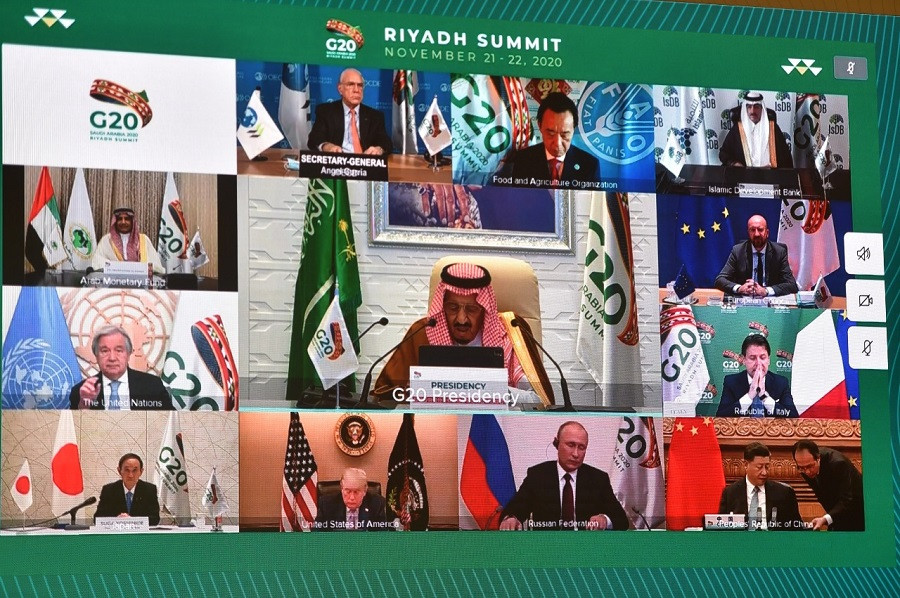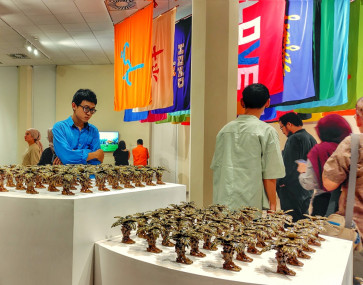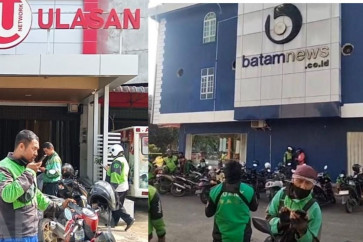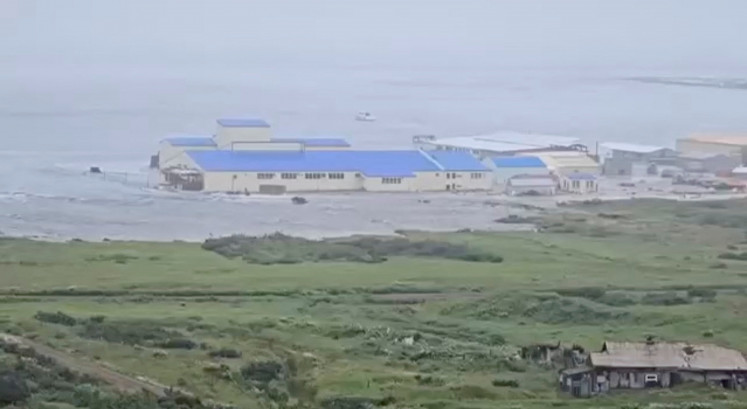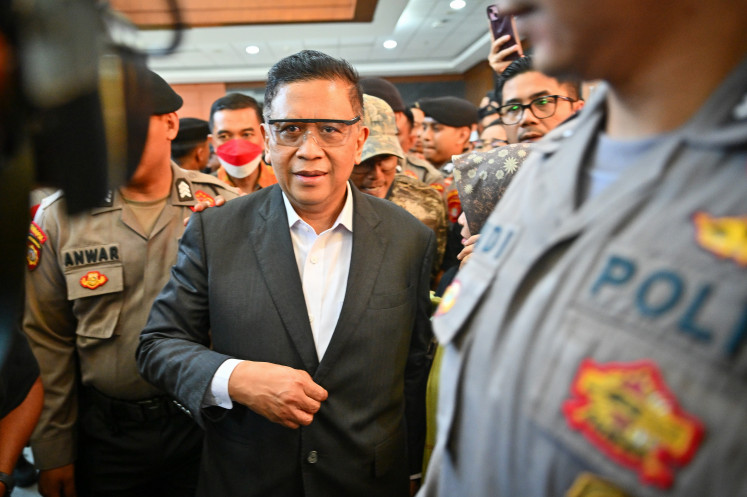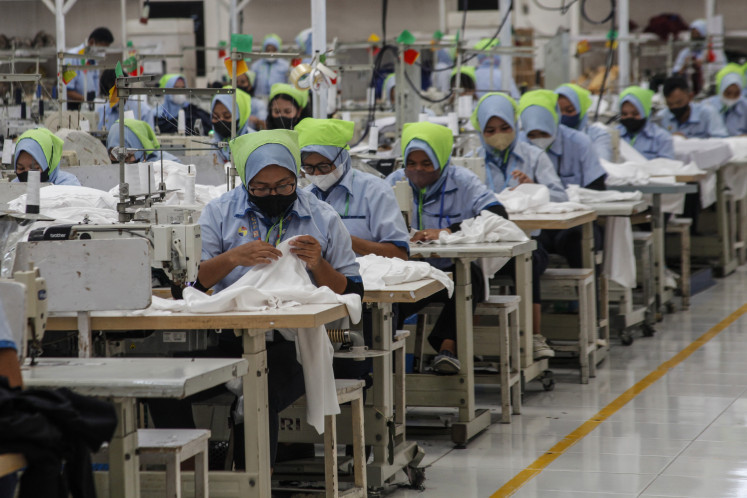Popular Reads
Top Results
Can't find what you're looking for?
View all search resultsPopular Reads
Top Results
Can't find what you're looking for?
View all search resultsIndonesia’s G20 presidency and global macro collectivity
Amid the ongoing economic recovery, solidarity should underlie the benign international perspective (outward) back to equilibrium.
Change text size
Gift Premium Articles
to Anyone

Indonesia will hold the 2022 presidency of the Group of 20 (G20). The official handover will take place at the G20 Summit in Rome on 0ct. 30-31.
President Joko “Jokowi” Widodo has chosen the bold theme “recover stronger, recover together”. The theme sets out the vision that no one is left behind and that the recovery from the pandemic-induced economic crisis is not a contest.
The G20 is a multilateral forum that consists of 19 countries and the European Union. It represents 80 percent of the global gross domestic product (GDP), 75 percent of global trade and about two-thirds of the world’s population. Membership is exclusive, but it includes the perspective from advanced as well as emerging countries. Hence, the G20 presidency is a strategic opportunity that puts a spotlight on the nation.
To hold the torch of the G20 presidency amid the ongoing pandemic brings both opportunities and challenges. The COVID-19 pandemic has induced hardships in almost all countries. The invisible enemy attacks all low-, middle- and high-income countries.
At the beginning of the COVID-19 pandemic, most countries seemed to implement inward-looking policies, and arguably are still doing so. The rationale is to grant adequate protection for their domestic economies. But the truth is that the world is in this together. Domestic economic recovery will not be optimal if many countries are still unable to recover.
All countries around the globe need support from each other. That necessity makes economic diplomacy a strategic policy instrument in the effort to recover. Amid the ongoing economic recovery, solidarity should underlie the benign international perspective (outward) back to equilibrium.
Most international cooperation efforts, however, fall prey to the basic macro problem, i.e., the recursive collective action problem. Robert Hockett of Cornell Law School depicts the recursive collective action problem as a natural force of individual rationality, which recursively yields to a suboptimal outcome at the macro level. To take his notion seriously, one should think of advancing the scope toward the ultimate magnitude of civilization, i.e., the global sphere.
To realize that we are constantly dealing with so-called global macro collectivity summons, we must acknowledge that international leadership is challenging. The rationality of an individual nation naturally prompts a conflict of interests at the global level. Global leadership hence requires more than the “lead by example” notion. The fundamental value should be global collectivity. It might be a tough row to hoe, but not impossible with a decent formula. One nation’s aggressive domination should be cleared out of the equation.
Breaking down the theme for Indonesia's 2022 G20 presidency, we shall see two coherent dimensions of a great international leadership vision. The first reflects such togetherness and collectivity, which is highly relevant with gotong royong (mutual cooperation) as a fundamental value of Indonesia. The second shows bold optimism to build a stronger post-pandemic economic base. Both dimensions are suitable to fuel the global solidarity spirit to weather any challenges and move toward a brighter global future.
The pandemic has indeed served as a strong reminder of the prominence of solidarity and collectivity in the global economic constellation. Strategic agendas such as climate change, sovereign debt sustainability, digital economic and financial trends, and the enhancement of sustainable global financial architecture should be taken seriously. Indonesia through the 2022 presidency must be able to offer strategic initiatives and to convince the G20 members to act communally.
Legally, Indonesia's G20 presidency can be seen as the implementation of the constitutional mandate in the preamble to the 1945 Constitution, i.e., to participate in the establishment of a world order, which in the social aspect includes the economic pillar.
Strategic diplomacy should not only cover the interest of domestic economic growth but also ensure a global arrangement that is conducive to more sustainable growth. That means the task must be carried further. Indonesia must bear in mind that the benefit of G20 initiatives stemming from the 2022 G20 presidency should not only be for the exclusive members of the G20, but also for the rest of the world as the strategic ongoing concern.
Speaking about economic diplomacy, Indonesia is on the right track. Pandemic challenges cannot constrain innovations toward progress. We can see the expansion of local currency settlement (LCS) framework initiatives by Bank Indonesia for cross-border transactions. As of today, Indonesia holds strategic relationships with Malaysia, Thailand, Japan and China for LCS.
In addition, the international financial safety net framework has been ample to deal with the pandemic's impact on the financial sector. It can be seen from the vast array of liquidity backstop facilities, such as the Federal Reserve repo line.
Indonesia's current macro condition in many ways is also bracing for the 2022 G20 presidency. Some numbers are even breaking the roof amid the ongoing economic recovery. The trade balance that represents Indonesia’s external resilience hit US$4.47 billion in August, the highest since December 2006.
The new record is also manifested in the official foreign reserves. At the end of August 2021, Indonesia’s foreign reserves were recorded $144.8 billion, successfully exceeding the previous record of $138.8 billion in both February and April this year.
The G20 presidency is a tremendous opportunity to show the world that Indonesia is worth being considered to lead the global recovery. Thus, we should proactively assemble a positive international perspective of the nation’s potential. Indonesia must bring the spirit of global collectivity that would lead to better immunity of the global economy.
It is time to move beyond the concern of what the world could give to us and to convey what Indonesia can give to the world. Together we can.
***
The writer is a legal advisor at Bank Indonesia (BI). The views expressed are his own.

